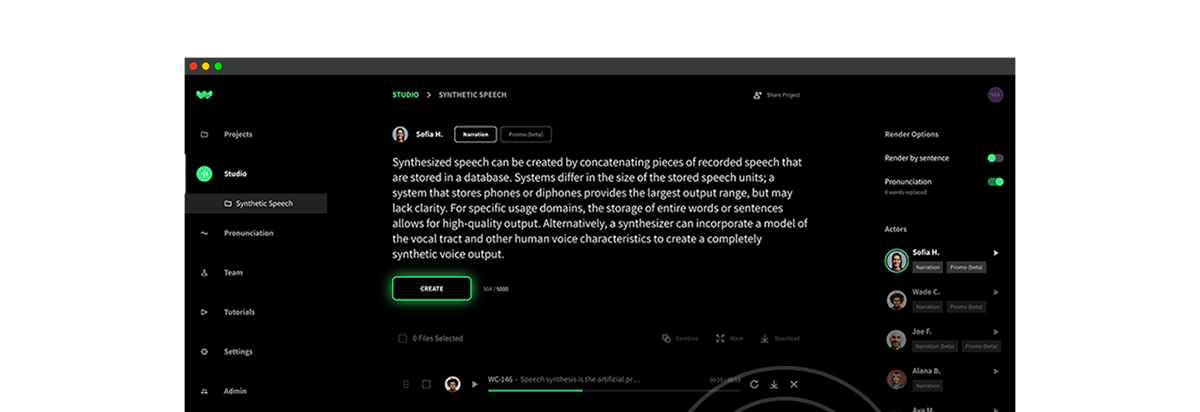Voice over production is an arduous, multi-step process. Before you get to the final cut, you have to generate the script, audition and hire a voice actor, and record initial takes and retakes in the studio. Each part of the process offers its own rewards and challenges that affect how long a project will take and, ultimately, influence its quality. In short, the voice over workflow impacts your schedule and your budget.
When you use text-to-speech instead of traditional voice acting, something magical happens. Your schedule and budget find flexibility. The final video can be easily updated when the inevitable post-production script changes happen. Some of the problems that arise in the traditional voice over workflow are quickly resolved, or even rendered obsolete, when you use TTS.
Drafting the Script
When you have access to a life-like, high-quality text-to-speech editor, you can try out different variations of your script in real time.
“Which word sounds better?” “Do I say it this way, or this way?”
With TTS, you can stop asking Sam from marketing to read each variation aloud (thanks, Sam), and ask your helpful, ever-present, realistic AI voices instead. Some writers we know use TTS as part of their crafting process, and they can vouch for this method. When listening to your words read aloud becomes an essential part of your creative process, your script develops into something tighter, leaner, and tailored for an auditory experience.
Writing a Casting Spec
You get to skip this part!
Auditioning and Hiring a Voice Actor
Looking for a “warm” voice? Need someone who sounds “authoritative”? A complete library of voices allows you to decide for yourself whether or not a voice has the exact qualities you’re looking for. Plus, you get to audition and re-audition your voice talent side by side, with script changes to boot. A process that would normally take about a week can take the better part of an afternoon instead.
When you audition, keep the length of your project in mind. If your video is part of a series, or if it’s connected to brand identity, you’ll want to retain consistency as you go. Some choose to put a voice actor on retainer, which is a viable albeit expensive option. Others choose to use an employee, who may or may not be trained in voice acting. Plus, if that person chooses to leave the company, there goes the brand’s voice, too. On the other hand, having access to a library of always-ready voices is an efficient alternative.
The Recording Session
Our voices are ready to read any iteration of your script at any time. No need to schedule appointments or book a studio—with TTS, your studio can be wherever you like to work, be it your office, outdoor patio… even your bathtub. No judgment here.

Say you’re halfway through creating your audio track using David’s voice. You demo the files with your team, but as you talk, it becomes clear the project really needs a female voice. With no change to your budget, and just as much time as it takes to render a file, you can have Ramona reading for you instead.
Final Edits
Hooray! Your voice overs are completed, and they’re sounding great. Load them up in the post-production software of your choice and you’re ready to put the final polish on your project.
Publish
The final product is ready! Share your vision with your employees, target audience, the world.
One last word
With text-to-speech, if you have a slight change to your script months after production but all other aspects of your project are still relevant, you don’t have to reproduce the entire thing. For instance, say your training video references the Head of HR, but she is now the Chief People Officer. Re-record a quick corrected clip using the same AI voice as you did before and edit your video. You’ve just saved a ton of time and resources, without sacrificing quality. That’s the beauty of text-to-speech.
Credits
Photo by Icons8 team on Unsplash
Music by bensound



